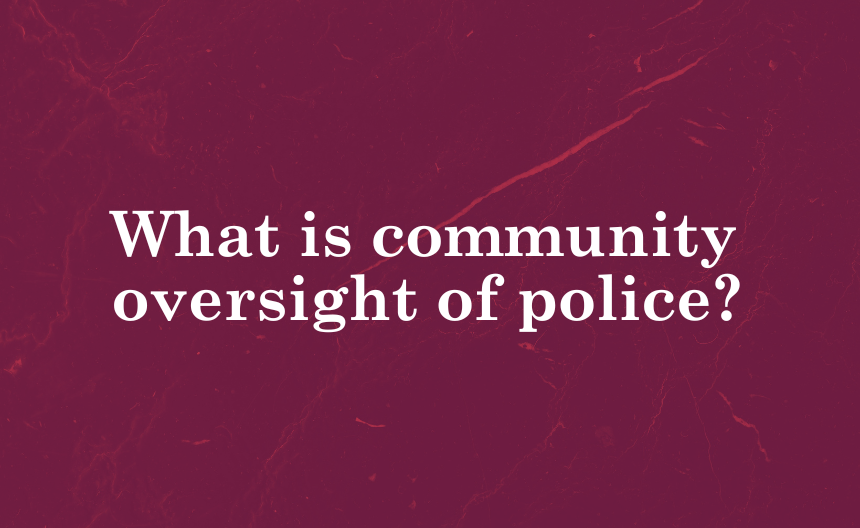In the wake of the police murder of George Floyd in 2020, leaders across Vermont committed to reimagine the role of police in our communities, increase police accountability, and advance racial justice initiatives. Though some important progress has been made in the last 3 years--like the adoption of a model use-of-force policy in 2020--we have seen too many elected officials and law enforcement leaders backpedal on their commitments and obstruct necessary police reforms, including legislative efforts to end qualified immunity or establish a statewide Brady Letter database, and community efforts to implement meaningful oversight of police in Bennington and Burlington.
As the legislature moves to once again take up some of these necessary police reforms in the 2023 Legislative Session, community control boards represent one of the most promising opportunities to build accountability and trust between law enforcement and the communities they serve.
What is a “civilian oversight” / “citizen review” / “community control” board?
These terms are used interchangeably in communities across the state to refer to an independent board comprised of community members who provide oversight and accountability to law enforcement. In order to be effective, these boards must be empowered to receive, investigate, and adjudicate complaints of police misconduct—and discipline or remove members of the police force if needed.
What need does a community control board fill?
By empowering community members to participate in police oversight, municipalities can foster greater transparency, accountability, and trust. This kind of civic participation lends much-needed checks and balances to the relationship between police departments and the people they serve. Creation of community control boards signal to communities that their leaders are committed to enabling meaningful engagement and oversight mechanisms.
S.75: An act relating to civilian oversight of law enforcement
Over the next few months, legislators in Montpelier have the opportunity to advance legislation that enables all Vermont communities to enhance police accountability. As introduced, S.75 would remove a major hurdle to meaningful community oversight of police by authorizing municipalities to create civilian oversight boards without undergoing a charter change. The bill would empower these boards to receive, investigate, and adjudicate complaints of misconduct against law enforcement officers, and grant them appropriate disciplinary power.
These provisions address a number of the problems facing the Bennington Community Policing Advisory Board that we highlighted in a June 2022 letter to the Bennington Select Board, and would enable communities across the state to more easily create meaningful systems of accountability.
Burlington voters to consider empowering an independent community control board on Town Meeting Day
Last year, community members in Burlington launched a citizen-driven petition to put community control of policing on the ballot. On March 7, Burlington voters will consider this proposed charter change--though it isn’t the first time the city has discussed creating an oversight board.
In 2020, Burlington City Council approved a plan to establish a police oversight board with the power to fire and suspend officers for misconduct and intended to put it before voters in March 2021. Mayor Weinberger vetoed the proposal, promising instead to grant investigatory and disciplinary authority to the city’s existing Police Commission and suggesting that his administration and Burlington City Council develop a special committee to write a new oversight proposal, up for vote in a special election in Fall 2021.
In September 2021, an independent consultant included in its assessment of the police department that the City should establish a citizen review board, in addition to granting additional power to the existing Police Commission. The full report is available here. In the end, Burlington voters were not given an opportunity to consider a charter change to establish greater police oversight at any point in 2021 or 2022.
On March 7th, Burlington voters will consider several charter changes, including the creation of an independent community control board as described in Question 7 on the ballot thanks to a grassroots petition drive.
Take action
Community control boards represent just one of the many reforms needed to fully reimagine policing in Vermont. This legislative session, we hope to see lawmakers advance several key bills that would improve policing practices, limit unnecessary interactions between community members and law enforcement, enable greater police accountability, and address persistent racial disparities in our criminal legal system.
Take a few minutes to fill out the forms below:

